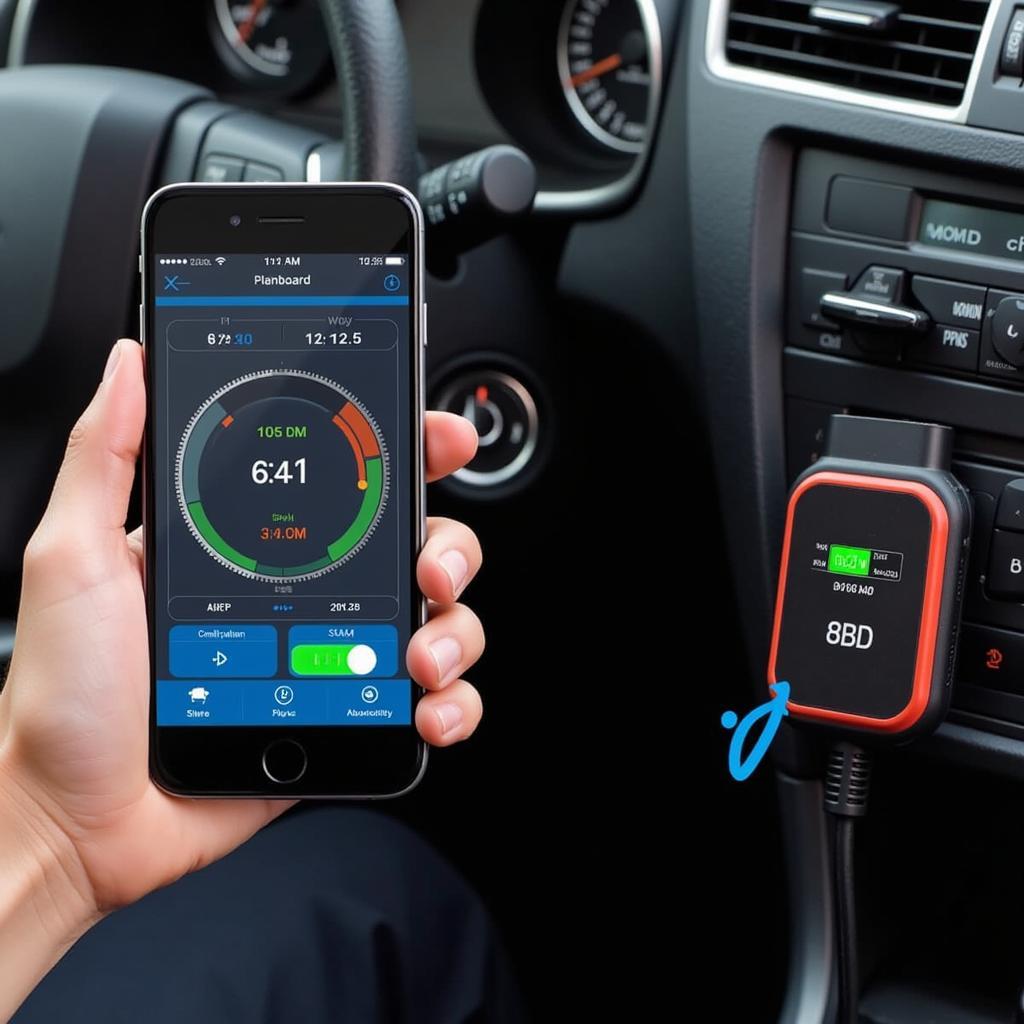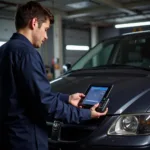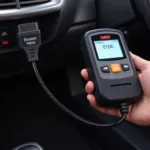Understanding your vehicle’s performance goes beyond just routine maintenance. Today, technology allows us to delve deeper into our car’s inner workings and gain valuable insights into its health, efficiency, and driving habits. One such technology that has revolutionized vehicle diagnostics is the OBD2 Bluetooth scanner, and when it comes to logging speed and other crucial data, it’s an indispensable tool for car enthusiasts and professionals alike.
Unlocking the Potential: How OBD2 Bluetooth Scanners Log Speed
OBD2, which stands for On-Board Diagnostics, is a standardized system that provides access to a vehicle’s electronic control unit (ECU). Think of it as the brain of your car, constantly monitoring and adjusting various systems. An OBD2 Bluetooth scanner acts as the bridge between your car’s ECU and your smartphone or tablet, allowing you to tap into a wealth of real-time data, including speed.
But how does it work? It’s surprisingly simple. The scanner plugs into your car’s OBD2 port, usually located under the dashboard on the driver’s side. It then establishes a wireless connection with your device via Bluetooth. Using a dedicated app, you can then view and record a wide range of parameters, including vehicle speed, engine RPM, coolant temperature, fuel efficiency, and much more.
Why Log Speed with an OBD2 Bluetooth Scanner?
You might be wondering why logging speed is useful. The answer lies in the wealth of information it provides:
- Performance Monitoring: Track your acceleration times, monitor speed variations, and analyze your driving patterns for a deeper understanding of your car’s capabilities.
- Fuel Efficiency Optimization: Analyze your speed in relation to fuel consumption to identify areas where you can adjust your driving habits for better mileage.
- Diagnostics and Troubleshooting: Sudden speed fluctuations or inconsistencies can be early indicators of potential mechanical issues, giving you a head start on diagnosis and repair.
- Enhanced Driving Safety: Reviewing speed logs can promote safer driving practices, especially for young or inexperienced drivers.
Choosing the Right OBD2 Bluetooth Scanner for Speed Logging
Not all OBD2 Bluetooth scanners are created equal. Some might excel in certain areas, like providing extensive diagnostic codes, while others may be more focused on real-time performance monitoring. When choosing a scanner for speed logging, consider these factors:
- Data Logging Capabilities: Ensure the scanner and app support continuous speed logging and data storage capacity meets your needs.
- Accuracy and Reliability: Look for scanners with proven accuracy and reliable Bluetooth connectivity for consistent and trustworthy data.
- App Features and User Interface: An intuitive and user-friendly app interface can make a significant difference in data visualization, analysis, and report generation.
- Compatibility: Verify that the scanner and app are compatible with your vehicle’s make, model, and year, as well as your smartphone or tablet’s operating system.
soliport elm 327 bluetooth obdii obd2 diagnostic scanner review
Taking Your Analysis to the Next Level
Once you’ve accumulated speed logs, the real power lies in data analysis. Many apps offer built-in features for visualizing your data through graphs, charts, and reports. For example, you can overlay a speed graph onto a map to pinpoint specific locations where speed fluctuations occurred.
“Analyzing speed logs can be incredibly revealing,” says automotive engineer Sarah Chen. “Not only can you track your own driving habits, but you can also identify potential vehicle issues early on. For instance, a consistent drop in speed during acceleration could point to a problem with the fuel system or transmission.”
OBD2 Bluetooth Log Speed: A Powerful Tool for Every Driver
In a world increasingly reliant on data, OBD2 Bluetooth scanners have emerged as essential tools for understanding our vehicles. By logging speed and other crucial parameters, drivers can unlock a new level of insight into their car’s performance, efficiency, and potential issues. Whether you’re a car enthusiast looking to fine-tune your ride or a responsible driver aiming to improve safety and fuel economy, OBD2 Bluetooth speed logging offers a powerful and accessible solution.
FAQ
1. Is it legal to use an OBD2 Bluetooth scanner?
Yes, in most countries, it is perfectly legal to use an OBD2 Bluetooth scanner for personal use. However, it’s essential to check local regulations regarding data logging and its permissible uses.
2. Can I use an OBD2 Bluetooth scanner on any car?
OBD2 scanners are compatible with most vehicles manufactured after 1996 in the United States and after 2001 in Europe. However, it’s always recommended to double-check compatibility with your specific car model.
3. How accurate are the speed readings from an OBD2 Bluetooth scanner?
OBD2 scanners typically provide highly accurate speed readings, often more precise than your car’s speedometer.
4. Can I share my OBD2 speed logs with others?
Yes, you can typically share your speed logs through the app or export them as files to share via email or other platforms.
5. Do I need an internet connection for OBD2 Bluetooth logging?
No, Bluetooth communication between the scanner and your device doesn’t require an active internet connection. However, some app features, like map overlays or cloud storage, might require internet access.
Common Scenarios Where OBD2 Bluetooth Log Speed Can Be Helpful:
- Tracking Delivery Drivers: Companies can monitor driver speed to ensure safety and adherence to traffic regulations.
- Monitoring Teen Driving: Parents can review their teenagers’ speed logs to encourage safe driving habits.
- Analyzing Race Track Performance: Drivers can use speed data to analyze lap times, acceleration, and braking performance.
Explore More:
- bluetooth obd2 protcol for 07 dodge grand caravan
- sampan obd2 app
- 7111 smart diagnostic system – obd2 tablet
- obd2 scan tool for apple
Need further assistance? Contact our 24/7 customer support team via WhatsApp: +1(641)206-8880 or Email: [email protected].


